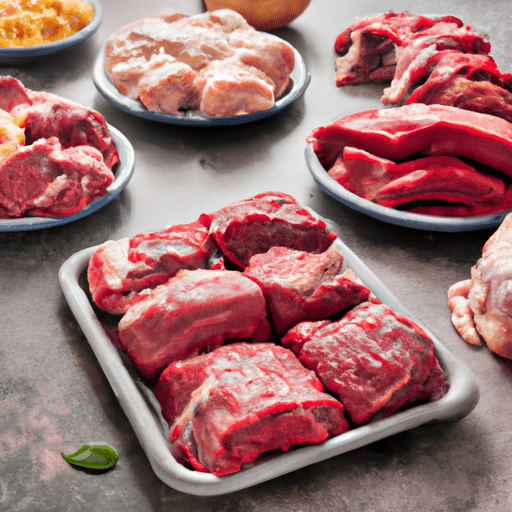In recent years, the demand for halal meat has experienced an unprecedented surge across the globe. This has given rise to a thriving industry that is integrating different cultures, forging new relationships and discovering new business opportunities to meet the needs of consumers. The halal meat industry has become a key driver of economic growth for various countries, providing jobs for people and contributing to the GDP. With an estimated global Muslim population of over 1.8 billion and increasing, the halal food industry is projected to reach a market value of $2.6 trillion by 2023.
Halal meat is derived from animals that are raised, slaughtered, and processed according to Islamic requirements. The process of halal slaughter involves cut to the jugular vein, carotid artery, and windpipe, while invoking the name of Allah (God), which makes the meat permissible for consumption for Muslims. The halal meat industry caters not only to Muslim consumers but also to non-Muslims who prefer meat slaughtered according to halal standards because of the humane nature of the slaughtering process.
The demand for halal meat can be attributed to various factors, such as the shift towards healthy eating habits, the growing Muslim population, globalisation and increased affordability. People are becoming more conscious about what they consume, and halal meat fits into that category because of the specific religious requirements that it meets. Moreover, as the Muslim population continues to grow, so does the demand for halal meat. Halal meat also appeals to non-Muslims who want to ensure that the animals they consume are treated humanely, and that the meat is sourced from verified ethical suppliers.
To meet the growing demand for halal meat, there is a need for suppliers who are willing to invest in the industry. There are different avenues for investing in the halal meat industry, including farming, slaughtering, processing, packaging, marketing, and distribution. The investments required can range from small to large scale, depending on the nature of the business. Small-scale suppliers could focus on farming livestock, while large-scale suppliers can take a holistic approach that covers the entire value chain of halal meat production.
One of the most significant players in the halal meat industry is Brazil. Brazil is the world’s largest exporter of halal meat, accounting for over 45% of the total global halal meat trade. Brazilian suppliers have been able to achieve this feat by leveraging their reputation for producing quality meat and leveraging the state-of-the-art equipment they use in their slaughtering and processing facilities. The Brazilian government also plays a significant role in promoting halal certification by creating a conducive investment climate, providing support to Brazilian companies seeking to obtain halal certification, and participating in various halal trade fairs worldwide.
Another supplier that has seen success in the halal meat industry is Australia. The Australian halal meat industry ranks second behind Brazil in total halal meat exports. Like Brazil, Australia has a reputation for producing quality meat, and it has invested heavily in producing premium-grade halal meat that appeals to Muslim consumers globally. Australian suppliers have also invested in traceability and farm-to-plate technologies, such as blockchain technology, to enhance the transparency of their supply chain.
The United States of America has emerged as another major player in the halal meat industry, thanks to the growing Muslim population in the country. American suppliers have tapped into the halal markets by investing in processing and packaging facilities that comply with halal certification. American suppliers also focus on ensuring that the halal meat is traceable to its source, which is an increasing demand from consumers worldwide. They are also collaborating with halal certifying authorities that are recognised globally, thereby enhancing the credibility of their halal certification.
Malaysia is another country that has emerged as a significant player in the halal meat industry, thanks to its robust halal certification framework. The Malaysian government has made significant investments in the halal industry, establishing Halal Industry Development Corporation (HDC), which acts as a central agency to develop the halal industry in Malaysia. The HDC has a comprehensive framework for halal certification, from farming, slaughtering, and processing to packaging and exporting.
In conclusion, the demand for halal meat has been growing exponentially in recent times, thanks to various factors such as the shift towards healthy eating, the growing Muslim population, and globalisation. The halal meat industry has become a vital driver of economic growth that offers business opportunities and jobs for different players along the value chain. Different suppliers worldwide have been able to capitalise on this demand by investing in different segments of the halal meat value chain, ranging from farming to exportation. As the demand for halal meat continues to grow, there will be a need for suppliers to leverage technology, ethics, and credibility to remain relevant and meet consumer needs.


